I accuse!
Dutch-language literature by authors with a background of migration in the 21st century
The reception of Dutch-language authors with a background of migration was not nearly as spectacular or as successful in the German language area as in the Dutch language area. But their work was also positively received in the German speaking world. In the early 21st century, however, the perspective on their work changed. While in the first translations, the primary focus was on language with which and the manner in which narration took place, in the second phase, the focus shifted rather to the message of their work.
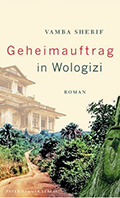
Basically, we can say that after 2005 it became quiet around the literature of Dutch-language authors with a background of migration. With two exceptions: Ayaan Hirsi Ali and Nahed Selim, about which more in a moment. No real success in any case was Geheimauftrag in Wologizi by the Liberian Vamba Sherif, who had come to the Netherlands in 1993. Published by Peter Hammer in 2009, the book was basically well received:
"The 36-year-old succeeds in making an African investigator fail in an African story in an African expanse. And both the story and the failure are magnificent" (Bathe, 2009),
But a breakthrough did not materialise. A second translation of Vamba Sherif's work has not appeared in the German-speaking world since.
Fikry El Azzouzi
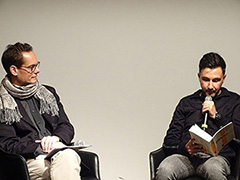
Ilja Braun and Fikry El Azzouzi
photo: ©Julia Braun
Basically, the Dutch-language literature of migrants comes again to the attention of the German-speaking world again around 2016. That this is linked to the fact that Flanders and the Netherlands are hosting the Frankfurt Book Fair for the second time at that time is obvious. (Frankfurter Buchmesse; #Fairs) In 2016, for example, Samir, genannt Sam, the translation of De belofte van Pisa (The promise of Pisa) by Mano Bouzamour, will be published (see: Mano Bouzamour). In the same year, Rodaan Al Galidi's translation of Koelkastlicht (Refigerator light, dt. Kühlschranklicht) also hits the German market. Kühlschranklicht is a remarkable. It is one of the few book collections of poetry by a Dutch-speaking author with a background of migration.
Like Bouzamour's work, Fikry El Azzouzi's work centres on radicalisation, disorientation, discrimination and criminality. Bouzamour and the Flemish El Azzouzi (El Azzouzi is of Moroccan descent but born in Temse and thus a second-generation migrant (or, as he himself says, a ‘Moroccan naturalised to Belgian’) thematise migration in a different way from authors such as Abdolah and Bouazza.
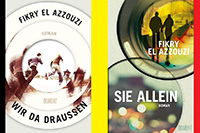
Wir da draussen (Us out there) is about four friends who belong nowhere, get bored, cross borders. The whole thing is set in a "youth gang language " (Kalkowski, 2016), a "flapsy" (Monica Carbe: quoted by: Perlentaucher, 2003) language that people in the German-speaking world had also come to know through the work of Khalid Boudou (Lehrjahre im Schnitzelparadis, 2003, (Apprenticeship in Schnitzelparadise)).
By no means everyone finds Wir da draussen convincing. One experiences the book as little more than "a snapshot of forgotten people who have to fill the emptiness of their lives with something" (Weigand, 2016). What one misses with Fikry El Azzouzi, especially with Wir da draussen, is literary power. "Fikry El Azzouzi is not a subtle artist of language", it is stated in Deutschlandfunk (Auffermann, 2017). El Azzouzi simply writes "scratch" (Petzold, 2016). El Azzouzi leaves it to the reader to decide what is ultimately possible and what is not:
"His narrative tone is cheeky to ironic, the humour bordering on cynicism. As a reader, you can't help wondering where fun and seriousness merge here, what content is still allowed to be mocked today - and above all, who is allowed to do that?" (Book Doctor, 2016)
El Azzouzi's books convince because of their content. Wir da draussen is “is very thought-provoking" (Kalkowski 2016) and Sie allein (She allone) (2017) was evaluated as a truly convincing "touching love story" (Buchdoktor, 2016) as a "grandiose, pessimistic novel" (Algieri, 2018).
Woman authors with a background of migration
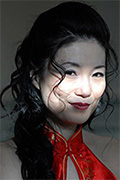
Photo: Wikipedia
As already shown, it is mainly male authors who define the image of migrant Dutch-language literature in the German-speaking world. However, this does not mean that woman authors have not set important accents. For example, Lulu Wang received already in the late 1990s special attention. Lulu Wang is a Chinese writer who has lived in the Netherlands since 1986. Wang's debut Het lelietheater (The lily theater) received the 1998 Golden Donkey Ear for best-selling literary debut. Het lelietheater, in which she describes her childhood during the Cultural Revolution, was almost immediately translated into German and had three different print runs in the German-speaking world under the title Das Seerosenspiel. In 1999, her book was awarded the 'Literaturpreis der Osterfestspiele' (Ein fest für die Literatur, 1999)
At the beginning of this century, the Romanian writer Nausicaa Marbe made her debut in the German-speaking world. In translation by the renowned translator Marianne Holberg, her debut appears at Goldmann.
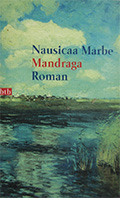
Unlike in the Dutch language area where the book was awarded the 'Charlotte Köhler Prize, Mandraga did not really attract much attention in the German language area. That did not really change with the publication of Marbe's second book, the translation of the crime novel Smeergeld - awarded as the best Dutch thriller of the year 2015 -, which was published in 2016 under the title Schmiergeld (Kickbacks) on the occasion of the second hosting of Flanders and the Netherlands at the Frankfurt Book Fair. (Frankfurter Buchmesse; #Fairs) Schmiergeld was kindly reviewed in, among others, the Süddeutsche Zeitung:
"Despite her descriptive narrative style, Nausicaa Marbe manages to keep the tension going. And she also manages to convey that her home city of Bucharest [...] still has romantic corners" (Maidt-Zinke, 2016)
But the second title of Marbe had no similar success as in the Dutch language area.
I accuse!
Rachida Lamrabet
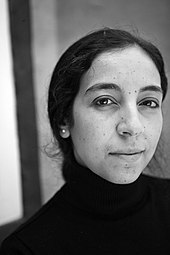
Photo: Wikipedia
Rachida Lamrabet who came to Flanders from Morocco as a child, writes about migration, discrimination, racism and the search for one's identity. Until 2017, she also worked as a lawyer at the Interfederal Equal Opportunities Centre UNIA. Lamrabet has also written several theatre texts. In 2007, she made her debut with Vrouwland (Woman's land). Two years later, this novel about a young Moroccan's search for her own identity and Moroccan men's fear of European women was published in German translation by Luchterhand. Unlike in Flanders, where the book was awarded the prize for best debut, the book did not really fall into favour in the German-speaking world. Die Zeit does recognise the importance of the book and discovers with Lamrabet an "interesting new voice " (Knoblauch 2010) but the reviewer does not find Frauenland really convincing: "Lamrabet does not succeed in penetrating the surface and finding a language for [the] contradictory and agitating feelings and thoughts" (Knoblauch 2010).
Despite this not particularly successful start, in 2012 Luchterhand publishes another translation of Lambaret's work. This time it is the translation of stories from the 2008 collection Een kind van God (A child of God), in which Lambaret once again addresses the problems of migrants making their way in Western society. Once again, it remains without success. Although the few reviews that appear are rather positive - "clever, pointed, sometimes funny and at other times deeply sad" ('Rachida Lamrabet, 2013), the stories hardly find response among the general public.
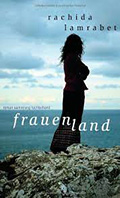
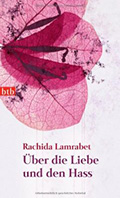

After 2012, no more of Lamrabet's work appears in German translation. The fact that she stayed in Vienna as a 'Writer in residence' in 2014 did little to change this. Even after 2012, Lamrabet's name does keep cropping up in reflections on Dutch-language literature and migration, in particular, of course, in the year 2016, on the occasion of the Frankfurt Book Fair (#Fairs), but new translations of her work do not appear in the German-speaking world after 2012.
Ayaan Hirsi Ali
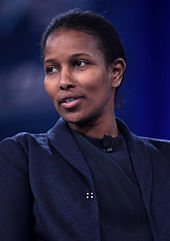
Photo: Wikipedia
At the time of writing this comments, it is 20 years since Dutch director Theo van Gogh was brutally murdered on an open street by a young radical Muslim. On his victim's chest, the killer attached a letter containing death threats to Mogadischu-born Ayaan Hirsi Ali, who had written the text for Submission, van Gogh's film about the oppression of women in Muslim families. In the killer's eyes, Theo van Goch and Ayaan Hirsi Ali were enemies of Islam who had to die.
Ayaan Hirsi Ali, at the time a politician and member of the second chamber, was known and contested for her criticism of Islam and Islamist culture. In 2002, she published her book De zoontjesfabriek (Sons factory, dt. Ich klage an), in which she had compiled a number of articles on women, Islam and integration. The book was heavily reviewed and published by Piper in 2005 in both German and Turkish translation. Hirsi Ali is convinced that Muslims have completely lost sight of the balance between religion and reason. Her arguments are also attracting attention in the German-speaking world. Interest in the living conditions of muslimas is high in the German-speaking world at the time.
Unlike Rachida Lamrabet's not really less engaging work, Ayaan Hirsi Ali's work remains prominent in the German market after the publication of Ich klage an (). Her autobiography Mein Leben, meine Freiheit was published in 2007, and after that her new work was translated (from English!) fairly quickly: Adan und Eva (Adan and Eva) in 2008, Ich bin eine Nomadin (Nomad) in 2010, Reformiert euch! (Heretic. Why Islam needs a Reformation now ) in 2015 and Beute in 2021.
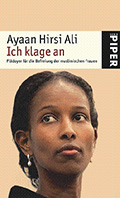
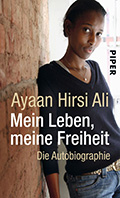
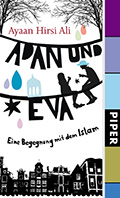
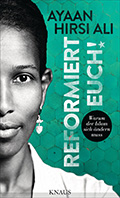
"Even if her texts don't conjure up any new scandals, they are certainly stirring. Especially as they are written by a woman who herself comes from the society she is settling accounts with here. And who would like nothing more than for others affected to find the courage to do the same." (Winter, 2005)
It is notable that Ayaan Hirsi Ali's translations in the German-speaking world did not ultimately provoke similarly vehement reactions as in the Netherlands, where the person Hirsi Ali was highly controversial not only as an asylante - Hirsi Ali had made up pieces of her refugee story - but also as an author and much sought-after speaker on television. Ultimately, Ayaan Hirsi Ali was even sued for discrimination, for stamping Mohammed's marriage to a nine-year-old girl as perverse and the prophet as a paedophile. As early as 2002, Hirsi Ali received permanent police protection and lived at a safe house. After the murder of Theo van Gogh and new death threats, she decided to leave the Netherlands and emigrate to America.
Things were much calmer in the German-speaking world, and this despite having expected protests and perhaps even threats. Even the translators of Ich klage an found it necessary to hide themselves behind a pseudonym. But in the end (fortunately enough) it did not turn out as feared.
Although the work of the "most hated critic of Islam in the world" (Dietz, Georg 2015) did cause a stir for many years - the number of publications that mention Ayaan Hirsi Ali in the German language area is enormous - she was not - as far as we know - threatened in Germany in a similar way. There is no obvious explanation for this, but it probably it has to do with the fact that Ayaan Hirsi Ali in the Netherlands did not act from the outside, but rebelled there as a famous, controversial and notorious member of Dutch society from within against her own society .
Selim Nahed
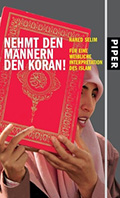
A year after the publication of Ich klage an, the translation of De vrouwen van de profeet (The wives of the prophet) by Selim Nahed (Ägypten) appears in Germany. The book is also published by Piper under the title: Nehmt den Männern den Koran (the translators use the same pseudonyms as for their translation of Ich klage an by Ayaan Hirsi Ali!)
Nahed's " Approaches to Muslim feminism" (Beucker, 2007) attracted attention and the book sold well (a paperback will be published in 2007) but the place Selim Nahed was able to carve out as an Islam critic in the German-speaking world was by no means comparable to Ayaan Hirsi Ali's, probably also because Selim Nahed's work was less radical:
"Nahid Salim is rebelling. But she rebels against religion as such, unlike others. She wants to remain a Muslim. There are two camps of those who deal with ‘Islam in the modern world’. On the one hand, there is a group around Ayaan Hirsi Ali and others. Together with the later murdered Theo van Gogh, the Dutchwoman of Somali had made the film ‘Submission’ which denounced the oppression of women by Islam. Only those who renounce this religion can find their way into modernity, says Ayaan Hirsi Ali. The reason for this, she says, is inherent with the values of modernity: freedom, equality, tolerance, democracy. Nahed Salim believes this approach is wrong. A Muslim does not have to detach himself completely from his religion. It's about adapting the religion to the realities of modernity". (Amirpur 2006)
Coda: Children's and youth literature
Children's books (#Children's literature) play an important role in the portrayal of different cultures, and migration has been repeatedly themed in Dutch children's and youth literature in recent years. In Karin Amatmoekrim's Het gym (The gym), the protagonist has to choose between several possible identities, and in Kristien Dieltiens and Meysam Noori's Dansen voor je leven (Dancing for life), to cite a second example, it is about the struggle with one's own ethnicity.
Deserve an award
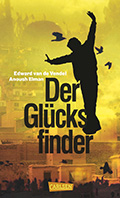
Published in German was De geluksvinder (The fortune finder) (2008) by Edward van de Vendel and Anoush Elman in 2011. The book was well received in Germany. The author was no stranger to it either. (see: Edward van de Vendel). But in this case it was a very special book. Der Glückfinder which tells the story of Hamayun who flees with his family from Afghanistan where the Taliban are running a reign of terror, is perceived as a very special book about refugees. Der Glückfinder is a book that stands “out of the mass” (Niklas 2016).
"The story is exciting, varied, full of surprising twists and turns and above all: touching and authentic. Both the protagonists and their lives seem authentic and unfortunately also frighteningly realistic. All the important topics of the refugee issue are prepared for a young target group and packed into an interesting and moving novel." (Niklas, 2016)
This book deserves a prize, writes Astrid van Nahl, because it sets "new standards" (Van Nahl, 2015) and does not "attack, but understands and tries to understand where reason is no longer enough" (Van Nahl, 2015).
'You must follow your fist'
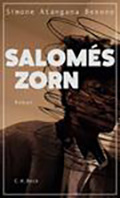
A real success was the translation of Confrontaties (Confrontations, dt. Salomés Zorn) the 2020 debut of Simone Atangana Bekono. In Confrontaties (dt. Salomés Zorn) Simone Atangana Bekono, daughter of a Dutch mother and a Cameroonian father, tells the story of 16-year-old Salomé, who is in a juvenile detention centre for mistreating schoolmates. More or less in vain, she tries to hold her own among the other detainees. Salomé's Zorn was published by Beck in Munich in 2023. The book immediately attracted attention and almost immediately appeared in the recommendation list of several radio stations. A substantial role in this was certainly played by the fact that the German Author, TV presenter, literary critic and journalist, Elke Heidenreich, mentioned Salomés Zorn in her Spiegel Kultur programme at the beginning of Febr. 2023:
"It's a first novel, a big hit, I think, about violence, about marginalisation and about saving intelligence. Simone Atangana Bekono is just over 30 and she can write!" (Heidenreich, 2023).
Since then, Simone Atangana Bekono has been unmissable in the world of literary blogs in the German-speaking world.
"Anyone who has ever caught themselves thinking - well, they should be deported - is recommended to read this book. It doesn't sugarcoat anything, it doesn't defend, it doesn't defend across the board, it doesn't accuse - but it does explain how the feeling of being a stranger can dominate a life. And gives hope that one or two young people might still be able to turn the corner with outside support. Important and topical!" (Bergold 2023)
One eagerly awaits her next book.
(Herbert Van Uffelen)
References
Algieri, Angelo: Knutsch und gut - Schlimmer geht immer: Fikry El Azzouzi radikalisiert Europa und hofft auf die Liebe. In: Freitag, Issue: Febr., (2018)
Amirpur, Katjun: Nehmt den Männern den Koran. In: Deutschlandfunk, Issue: 11. Sept., (2006) (https://www.deutschlandfunk.de/nehmt-den-maennern-den-koran-100.html)
Auffermann, Verena: Liebe in Zeiten des Terrors. In: Deutschlandfunk Kultur, Issue: 14. Nov., (2017) (https://www.deutschlandfunkkultur.de/fikry-el-azzouzi-sie-allein-liebe-in-zeiten-des-terrors-100.html)
Bathe, Dirk: Geheimauftrag in Wologizi. In: DW, Issue: 2. Sept., (2009) (https://www.dw.com/de/geheimauftrag-in-wologizi/a-4617192)
Bergold, Tanja: Salomés Zorn. In: Borromaeusverein - Rezensionen, Issue: 29. Nov., (2023)
Beucker, Pascal: Ansätze eines muslimischen Feminismus. In: TAZ, Issue: 10. März, (2007)
Buchdoktor: Wer einen Muslim liebt, ist sofort verdächtig - Eine brennend aktuelle und dabei bewegende Liebesgeschichte. In: Wasliestdu, (2016) (https://wasliestdu.de/rezension/wer-einen-muslim-liebt-ist-sofort-verdaechtig-eine-brennend-aktuelle-und-dabei-bewegende)
Dietz, Georg: Botschaft vom Scheiterhaufen. In: Der Spiegel, Issue: 13, (2015) - p. 128-133
Ein Fest für die Literatur. In: Salzburger Nachrichten, 25. März, (1999) - p. 19
Heidenreich, Elke: Sag zum Abschied einfach A. In: Spiegel Kultur, Issue: 5. Febr., (2023)
J.A.: Die Reise der leeren Flaschen - Entdeckung des Fremden. In: Hellweger Anzeiger, Vol.: 23-07-1999, (1999)
Kalkowski, Uwe: Die da draußen. In: Kaffeehaussitzer, Issue: 11. Dez., (2016) (https://kaffeehaussitzer.de/fikry-el-azzouzi-wir-da-draussen/)
Knoblauch, Elisabeth: Dort bist du der Loser. In: Zeit Online, Issue: 3. Febr., (2010)
Maidt-Zinke, Kristina: Erpressung - Die neue Nachbarin. In: Süddeutsche Zeitung, Issue: 17. Nov., (2016)
Niklas: Edward van de Vendel, Anoush Elman - Der Glücksfinder. In: Literaturschock.de, Issue: 16 Nov., (2016) (https://literaturschock.de/literatur/belletristik/kinder-und-jugendbuecher/edward-vendel-anoush-elman-gluecksfinder)
Perlentaucher, Lehrjare im Schnitzelparadies, 2003 (https://www.perlentaucher.de/buch/khalid-boudou/lehrjahre-im-schnitzelparadies.html)
Petzold, Jörg: Fikri El Azzouzi - Wir da draußen. In: Flux FM, Issue: 28. Nov., (2016) (https://archiv.fluxfm.de/fikry-el-azzouzi-wir-da-draussen-lesen-und-lesen-lassen/)
Rachida Lamrabet - Über die Liebe und den Hass. In: Bücherwurmloch.at, Issue: 25. Febr., (2013) (https://www.buecherwurmloch.at/2013/02/25/rachida-lamrabet-uber-die-liebe-und-den-hass/)
Van Nahl, Astrid: Edward van de Vendel & Anoush Elman - Der Glücksfinder. In: Alliteratus, Issue: Dez., (2015)
Weigand, Sophie: Fikry El Azzouzi - Wir da draussen. In: Literaturtourismus.net, Issue: 17. August, (2016) (https://literatourismus.net/2016/08/fikry-el-azzouzi-wir-da-draussen/)
Winter, Anne: Ich klage an. In: Deutschlandfunk Kultur, Issue: 18. Mai, (2005) (https://www.deutschlandfunkkultur.de/ich-klage-an-102.html)
